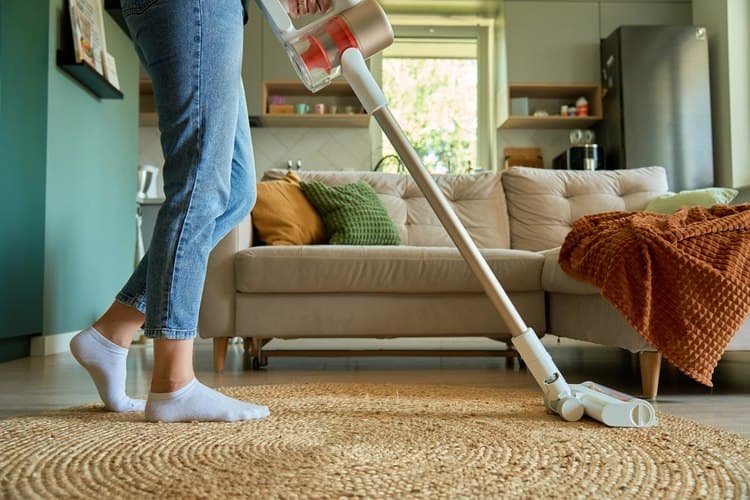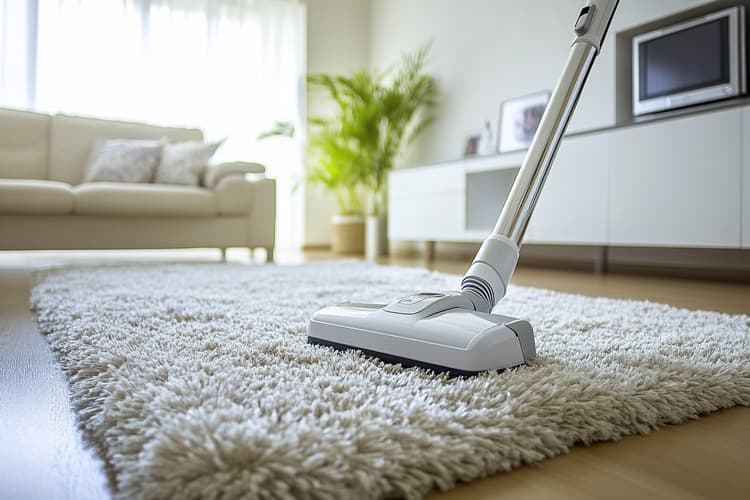The Ultimate Guide to Buying a Vacuum Cleaner
Chloe Edwards • October 31, 2024 • 9 min
Finding the right vacuum cleaner can be challenging, especially with the variety of models and features available today. This guide will walk you through the different types of vacuum cleaners, considerations for cost and benefits, essential buying tips, and strategies to save money.

Whether you're shopping online or choosing a vacuum specifically for seniors, this article will help you make an informed decision.
Types of Vacuum Cleaners
When shopping for a vacuum cleaner, it’s crucial to understand the different types available on the market. Each type is designed for specific cleaning needs and may be better suited to certain floor types or cleaning preferences.
-
Upright Vacuum Cleaners
Upright vacuums are popular in homes with large carpeted areas. They are powerful, often have wide cleaning heads, and can cover larger areas quickly. Many models now come with various height settings to work on both carpets and hard floors. While they are effective for deep cleaning, upright vacuums can be bulky and harder to maneuver, especially on stairs. -
Canister Vacuum Cleaners
Canister vacuums offer greater flexibility than upright models, thanks to their separate body and wand. This design makes them lighter to maneuver and ideal for cleaning stairs, upholstery, and under furniture. Canister vacuums usually perform well on both hard floors and carpets, but they tend to be more expensive and take up more storage space. -
Stick Vacuums
Stick vacuums are lightweight and convenient, making them perfect for quick cleanups or small living spaces. They are typically cordless, which adds to their portability, but they may lack the power needed for deep carpet cleaning. Stick vacuums are a popular choice for apartment dwellers or people who need a secondary vacuum for touch-ups. -
Robotic Vacuum Cleaners
Robotic vacuums are autonomous devices designed to clean with minimal intervention. They are a great choice for busy households or individuals who have difficulty operating traditional vacuums. Robotic vacuums are best suited for hard floors or low-pile carpets and work well as a supplementary cleaning tool. However, they may struggle with thick carpets and require regular maintenance. -
Handheld Vacuum Cleaners
Handheld vacuums are small, portable, and perfect for quick spot cleaning or reaching tight spaces. They are commonly used for cleaning car interiors, furniture, and other small areas. While highly convenient, handheld vacuums lack the power and versatility of full-sized models and are usually used in addition to a primary vacuum.
Each type of vacuum cleaner has distinct advantages and disadvantages. Selecting the right type largely depends on your specific cleaning needs, the type of flooring in your home, and your personal preferences.
Cost/Benefit Analysis of Different Vacuum Cleaner Types
Choosing a vacuum cleaner often involves balancing costs with potential benefits. Each type of vacuum cleaner comes with its own price range and benefits that justify the investment for different users.
-
Upright Vacuum Cleaners
Upright models typically range from $100 to $500. They offer strong suction power and are especially effective for carpeted areas. The cost is justified if you need deep cleaning power, but they can be overkill in homes with mostly hard flooring. -
Canister Vacuum Cleaners
These vacuums usually cost between $150 and $600. They are highly versatile and suitable for a variety of flooring types. The added expense is worth it for homes with a mix of carpet and hard flooring, but may not be necessary if you only have one type of flooring. -
Stick Vacuums
Stick vacuums are generally priced between $100 and $300. Their lightweight design is convenient for quick clean-ups, but they lack the power for deep cleaning. For smaller homes or as a second vacuum, the cost is manageable and can be a worthwhile investment. -
Robotic Vacuum Cleaners
Robotic vacuums are one of the more expensive options, ranging from $200 to $1,000. They are an excellent option for those who want to automate cleaning, but the high price may not be justifiable if you have thick carpets or require deep cleaning. -
Handheld Vacuum Cleaners
Handheld vacuums are typically affordable, costing around $20 to $150. They are a convenient, low-cost option for specific tasks but don’t offer the versatility or power needed for whole-home cleaning.
When considering the cost of a vacuum cleaner, think about how often you’ll use it and on what types of surfaces. A more expensive vacuum might be a better value over time if it meets your specific cleaning needs.
5 Things You Shouldn't Forget When Buying a Vacuum Cleaner
Selecting the right vacuum cleaner requires attention to detail. Here are five essential factors you shouldn’t overlook when making your purchase:
-
Suction Power
A vacuum’s suction power determines its cleaning efficiency. Consider models with adjustable suction levels if you have different flooring types. -
Weight and Maneuverability
Heavier vacuums can be challenging to carry up stairs or move around the house. Stick or canister models may be better for users who prioritize maneuverability. -
Noise Level
Vacuum cleaners vary in noise output. If noise is a concern, look for models marketed as "quiet" or check reviews for information on decibel levels. -
Filter Type
High-quality filters like HEPA filters are crucial for households with allergies, as they trap dust and allergens effectively. Ensure the vacuum has a filter that suits your household needs. -
Corded vs. Cordless
Cordless vacuums offer greater flexibility but may have limited battery life. Decide if you need the freedom of a cordless model or prefer the consistent power of a corded vacuum.
These factors can significantly impact your overall satisfaction with your vacuum cleaner. Consider your specific needs and lifestyle to ensure you choose a model that fits.
Easy Ways to Save Money on Your Next Purchase
Vacuum cleaners can be a significant investment, but there are several strategies you can use to save money without compromising quality.
-
Shop During Sales: Major sales events, such as Black Friday, Cyber Monday, and holiday sales, often offer discounts on household appliances, including vacuum cleaners.
-
Look for Refurbished Models: Many retailers sell refurbished vacuums at a lower price. These models are typically inspected and restored to function like new, making them a cost-effective option.
-
Use Price Comparison Tools: Online tools can help you track prices across different retailers to find the best deal. Websites like CamelCamelCamel and Honey can track price history and alert you to discounts.
-
Sign Up for Newsletters: Some retailers offer exclusive discounts to newsletter subscribers. You can save on your purchase by taking advantage of these promotional offers.
-
Consider Generic Accessories: For parts like bags, filters, and attachments, generic options can save you money over brand-name accessories.
By applying these strategies, you can reduce the cost of your next vacuum purchase without sacrificing quality or performance.
How to Get a Discount on Vacuum Cleaners
If you're looking to buy a vacuum cleaner at a lower price, here are a few methods to get a discount:
-
Check Manufacturer Websites: Brands often run promotions or discounts on their official websites, especially when launching new models.
-
Use Coupons: Look for coupons online or in circulars. Websites like RetailMeNot and Coupons.com frequently offer discount codes for popular brands.
-
Wait for Clearance Sales: Retailers clear out older models to make room for new inventory. You can find great deals during these clearance events.
-
Join Loyalty Programs: Some stores offer loyalty programs that provide points or cashback on purchases, which can reduce the overall cost.
-
Negotiate at Smaller Retailers: At smaller appliance stores, you may have some room to negotiate, especially if you're buying a high-end model.
Taking advantage of these options can lead to significant savings on your next vacuum purchase.

Buying a Vacuum Cleaner Online: Is it a Good Idea?
Buying a vacuum cleaner online has become increasingly popular, but it’s essential to weigh the pros and cons before making a decision.
Pros:
- Convenience: Online shopping allows you to compare prices and models from the comfort of your home.
- Wider Selection: Online retailers often have a broader range of products than physical stores.
- Customer Reviews: You can read reviews from other customers to get a sense of the product's performance.
Cons:
- No Hands-On Testing: You can’t test the vacuum before buying, which may lead to dissatisfaction if it doesn’t meet your needs.
- Shipping Costs: Some retailers charge hefty shipping fees, especially for bulky items like vacuum cleaners.
Overall, buying online is a convenient option if you’re confident in the model you’re purchasing. Just be sure to choose a retailer with a good return policy in case the product doesn’t meet your expectations.
Benefits of Ordering Online
Ordering a vacuum cleaner online comes with several distinct advantages, including:
- Competitive Pricing: Online retailers often offer better deals than physical stores due to lower overhead costs.
- User Reviews: You can gain insights from other buyers who have experience with the model you’re considering.
- Access to International Brands: Online shopping opens up options from international brands that might not be available locally.
Online shopping can be a smart choice if you’re comfortable researching products and reading reviews to ensure you’re making the best selection.
5 Tips for Seniors Choosing Their Next Vacuum Cleaner
Choosing a vacuum cleaner can be especially important for seniors who may have specific needs regarding ease of use and weight. Here are five tips to keep in mind:
-
Choose a Lightweight Model
Heavier vacuums can be difficult to lift and maneuver. Look for lightweight models that are easy to carry. -
Opt for a Self-Propelled Model
Self-propelled vacuums can help reduce the physical effort required, which can be beneficial for seniors with mobility concerns. -
Consider Ergonomic Designs
Vacuums with ergonomic handles are easier on the hands and wrists, which can make cleaning less strenuous. -
Look for Models with Simple Controls
Complicated controls can be frustrating. Choose a vacuum with straightforward, easy-to-use controls. -
Prioritize Low Maintenance
Models with bagless designs or easy-to-clean filters are less hassle and require minimal upkeep.
For seniors, comfort and convenience are key when choosing a vacuum. Prioritizing these factors can make cleaning tasks much more manageable.
Conclusion
Choosing the right vacuum cleaner requires careful consideration of your cleaning needs, budget, and lifestyle. Whether you’re looking for a powerful upright model, a convenient stick vacuum, or a robot to handle daily maintenance, there are options to fit every requirement. By weighing the costs and benefits of each type, looking for discounts, and considering online shopping options, you can find a vacuum cleaner that provides great value and meets your needs effectively.
Disclaimer
This article provides general information on selecting and purchasing a vacuum cleaner. It is not intended as financial, product, or purchasing advice. Always consult product specifications and reviews or speak with a sales representative to ensure a vacuum cleaner meets your specific requirements.
Sources
- "Types of Vacuum Cleaners", Consumer Reports.
- "How to Choose the Right Vacuum Cleaner", Good Housekeeping.
- "Best Vacuums for Allergies", Allergy & Air.
- "Buying Guide: Vacuum Cleaners", Wirecutter by The New York Times.
- "How to Save Money on Home Appliances", Forbes.